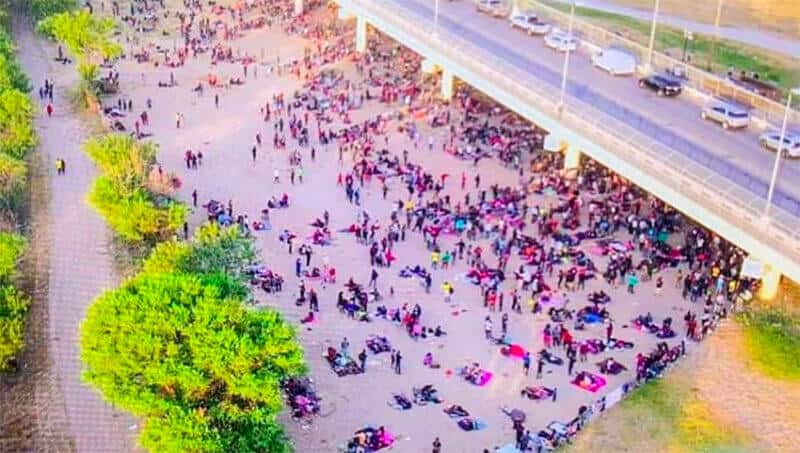Haitian migrants in Mexico will soon be deported on repatriation flights from two cities, according to the Associated Press (AP).
AP said it was informed by a federal agency that flights to Haiti from Monterrey, Nuevo León, and Tapachula, Chiapas, will commence in the coming days. The agency wasn’t identified because the officials who spoke to AP weren’t authorized to discuss the matter publicly. Mexico’s decision to fly Haitians home in large numbers represents a divergence from current practice as just 85 were repatriated between January and July, AP reported.
The speed at which Mexico can send the migrants back to their homeland will depend on how quickly Haitian authorities can confirm their nationality, the unidentified agency told AP. The airports chosen for the flights are relatively close to areas where large numbers of Haitians are concentrated.
Monterrey is about 500 kilometers south of Ciudad Acuña, a city in Coahuila where thousands of Haitian migrants have recently crossed the Rio Grande to enter the United States. It is just over 200 kilometers southeast of Reynosa, Tamaulipas, where hundreds more Haitians arrived over the weekend and many migrants are living in camps and shelters.
Located just north of the border with Guatemala, Tapachula is a hub for migrants who have recently entered Mexico. Many Haitians were returned there in recent weeks after being detained by authorities while walking northward in Chiapas in four migrant caravans.
The members of the caravan left the southern city after growing tired of waiting for their asylum claims to be processed. Some had been stranded in Tapachula for months.
About 19,000 Haitians have entered Mexico this year, more than triple the number who arrived in 2020. Haiti, the poorest country in the Western Hemisphere, remains mired in political turmoil in the wake of the assassination of its president in early July, and was struck by a devastating earthquake on August 14.
Thousands of Haitians who managed to reach Mexico’s northern border – with or without humanitarian visas that allowed them to transit the country legally – gathered last week in a makeshift camp below the Del Rio International Bridge in Texas.
There were 13,700 migrants in the camp on Friday, according to an estimate by Frank Joe Martínez, police chief in Val Verde County, located across the border from Ciudad Acuña. By Monday, the figure had climbed to 14,500.
The United States has already begun sending Haitians in the camp back to Haiti; three flights to Port-au-Prince departed Sunday. Six repatriation flights are expected to leave the United States on Tuesday, while seven are scheduled for Wednesday, according to a U.S. official who spoke with AP.
Acuña Civil Protection chief Carlos Flores said that neither his municipality nor Val Verde county have the capacity to attend to the large numbers of migrants who have descended on their shared border.

He said between 2,000 and 3,000 additional Haitian migrants are expected to arrive in Acuña this week. If the United States prevents them from crossing the Rio Grande, they would be left stranded in Acuña, a city of about 200,000 people.
“[Now] they get off buses and go directly to the crossing point. They don’t sit down in the [central] square or look for a shelter, … they go directly to the crossing point,” Flores said, referring to an area on the Rio Grande known as La Cuchilla.
“You can see that they have money. They’re families, you see a lot of parents with small children in their arms. They come back to Acuña to buy water, toilet paper, food. … There’s not a major problem now but if things get more difficult, what are we going to do? Acuña and Del Rio are not prepared to cope with this number of people,” he said.
The likelihood that things will become more difficult appears high as U.S. authorities began blocking the entry of migrants on Sunday. Border Patrol agents on horseback and Texas law enforcement officials prevented some migrants from re-entering the Del Rio International Bridge camp after they had crossed to Acuña to buy essentials, which the migrants say are not available in the camp.
A video published by Reuters showed one agent using what appeared to be a lariat against migrants as they reached the United States after wading across the Rio Grande. U.S. authorities had allowed migrants to cross back and forth at a shallow point of the river to buy food and water, but told them on Sunday they would no longer be permitted back into the country if they went to Mexico.
“We’re trapped,” 37-year-old Haitian Joncito Jean told Reuters. The migrant, who has been sleeping on a sheet on the ground with his wife and two small children for the past three days, said he regretted the decision to come to the border.
“There are no human conditions. … We have to break out to buy water,” he said.
However, United States Border Patrol Chief Raul Ortiz said that food and assistance were available to migrants in Del Rio.
“We are providing food, water, portable toilets, towels, emergency medical technicians are available for first aid,” he told a news conference Sunday.
“Over the next six to seven days our goal is to process the 12,662 migrants that we have underneath that bridge as quickly as we possibly can,” Ortiz said. “What we want to make sure is that we deter the migrants from coming into the region so we can manage the folks that are under the bridge at this point.”
Most of the Haitians are likely to end up on planes bound for home. According to the U.S. Border Patrol, some 3,300 migrants have already been removed from the Del Rio camp and and sent to detention centers or back to Haiti, despite protests from Haitian authorities who say they don’t have the resources to handle thousands of homeless deportees. Those deported were presumably deemed not to be genuine refugees and their claims for asylum in the U.S. were therefore rejected.
Meanwhile, a group of more than 400 Haitian migrants spent Friday night at a convention center in San Fernando, Tamaulipas, before traveling to Reynosa on Saturday, the newspaper El Universal reported. The members of the caravan, who traveled on foot and hitched rides where they could, reached a National Guard checkpoint early on Saturday afternoon but were not prevented from continuing their journey.
“Hallelujah!” they shouted after passing the checkpoint, where they thought they would be detained. Once in Reynosa, the migrants underwent health checks and were tested for COVID-19, El Universal said.
Ricardo Calderón, head of the Tamaulipas Institute for Migrants, said the Haitians attempted to cross the international bridge between Reynosa and Hidalgo, Texas, but were stopped by U.S. authorities. They were expected to head to Ciudad Acuña, although they will likely be blocked from entering the U.S. there as well.
With reports from AP, El Universal and Reuters
